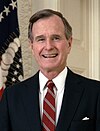
Presidential elections were held in the United States on November 5, 1996. Incumbent Democratic President Bill Clinton and his running mate, incumbent Democratic Vice President Al Gore were re-elected to a second and final term, defeating the Republican ticket of former Senate Majority Leader Bob Dole and former Secretary of Housing and Urban Development Jack Kemp and the Reform ticket of businessman Ross Perot and economist Pat Choate.

Presidential elections were held in the United States on November 3, 1992. Democratic governor Bill Clinton of Arkansas defeated incumbent Republican president George H. W. Bush and independent businessman Ross Perot of Texas. The election marked the beginning of a period of Democratic dominance and the end of a period of Republican dominance in American presidential politics that began in 1968, and also marked the end of 12 years of Republican rule of the White House.

Presidential elections were held in the United States on November 8, 1988. The Republican Party's ticket of incumbent Vice President George H. W. Bush and Indiana senator Dan Quayle defeated the Democratic ticket of Massachusetts Governor Michael Dukakis and Texas senator Lloyd Bentsen.

Patrick Joseph Buchanan is an American paleoconservative author, political commentator, and politician. Buchanan was an assistant and special consultant to U.S. presidents Richard Nixon, Gerald Ford, and Ronald Reagan. He is an influential figure in the modern paleoconservative movement in America.

The Reform Party of the United States of America (RPUSA), generally known as the Reform Party USA or the Reform Party, is a centrist political party in the United States, founded in 1995 by Ross Perot.

The 2000 presidential campaign of George W. Bush, the then-governor of Texas, was formally launched on June 14, 1999, as Governor Bush, the eldest son of former President George H. W. Bush, announced his intention to seek the Republican Party nomination for the presidency of the United States in the 2000 presidential election.

In political campaigns, an attack ad is an advertisement designed to wage a personal attack against an opposing candidate or political party in order to gain support for the attacking candidate and attract voters. Attack ads often form part of negative campaigning or smear campaigns, and in large or well-financed campaigns, may be disseminated via mass media.
"Read my lips: no new taxes" is a phrase spoken by American presidential candidate George H. W. Bush at the 1988 Republican National Convention as he accepted the nomination on August 18. Written by speechwriter Peggy Noonan, the line was the most prominent sound bite from the speech. The pledge not to tax the American people further had been a consistent part of Bush's 1988 election platform, and its prominent inclusion in his speech cemented it in the public consciousness.
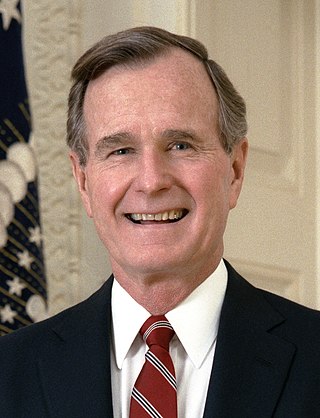
Presidential primaries and caucuses of the Republican Party took place within all 50 U.S. states and the District of Columbia between February 18 to June 9, 1992. The contests chose the 2,277 delegates sent to the national convention in Houston, Texas from August 17 to August 20, 1992, who selected the Republican Party's nominees for president and vice president in the 1992 United States presidential election and approved the party's platform. President George H. W. Bush was again selected as the nominee. The Republican ticket of President Bush and Vice President Dan Quayle went on to lose the general election to the Democratic ticket of Arkansas Governor Bill Clinton and Tennessee Senator Al Gore.

From January 29 to June 4, 1996, voters of the Republican Party chose its nominee for president in the 1996 United States presidential election. Senator Bob Dole of Kansas, the former Senate majority leader, was selected as the nominee through a series of primary elections and caucuses culminating in the 1996 Republican National Convention held from August 12 to 15, 1996, in San Diego, California. Dole resigned from the Senate in June 1996 once he became the presumptive nominee to concentrate on his presidential campaign. He chose Jack Kemp as his running mate.
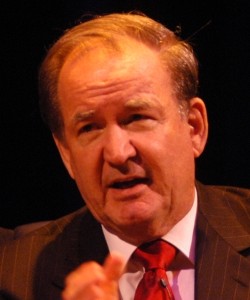
This is the electoral history of Pat Buchanan. Buchanan served as an advisor to three United States presidents: Richard Nixon, Gerald Ford, and Ronald Reagan. He then became a conservative columnist and co-hosted Crossfire, a political program on CNN.

The 2000 presidential campaign of Pat Buchanan, conservative pundit and advisor to both President Richard Nixon and Ronald Reagan, was formally launched on March 2, 1999, as Buchanan announced his intention to seek the Republican Party nomination for the presidency of the United States in the 2000 presidential election. It marked Buchanan's third primary campaign for the presidency, following his bids in 1992 and 1996. Although he had not attained the nomination either time, he had been regarded as a consequential party figure. Early primary surveys found Buchanan polling in the single digits and following the publication of his book A Republic, Not an Empire, which generally advocated for noninterventionist and "America first" foreign policy, some within the Republican Party condemned Buchanan's foreign policy views. There began to be speculation that Buchanan would leave the Republican Party in favor of the Reform Party, a third party qualified for matching federal campaign funds.

The 1992 United States presidential election in Georgia took place on November 3, 1992, and was part of the 1992 United States presidential election. Voters chose 13 representatives, or electors to the Electoral College, who voted for president and vice president.

The 1992 United States elections elected state governors, the president of the United States, and members of the 103rd United States Congress. The election took place after the Soviet Union crumbled and the Cold War ended, as well as the redistricting that resulted from the 1990 census. Often considered "The Year Of The Woman," these elections brought an increased number of female politicians to Washington such as Dianne Feinstein (D-CA) and Carol Moseley Braun (D-IL). Governor Bill Clinton of Arkansas defeated incumbent president George H. W. Bush and businessman Ross Perot in the presidential election. The Democratic Party maintained their control of both chambers of Congress. This is the first Democratic trifecta since the Republican victory in the 1980 elections, the last one in the 20th century, and the last one overall until 2008.
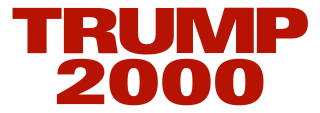
New York real estate magnate Donald Trump announced the creation of a presidential exploratory committee on the October 7, 1999, edition of Larry King Live on CNN. Although Trump had never held elected office, he was well known for his frequent comments on public affairs and business exploits as head of The Trump Organization. He had previously considered a presidential run in 1988 as a Republican, but chose not to run. For 2000, Minnesota Governor Jesse Ventura persuaded Trump to seek the presidential nomination of the Reform Party, which was fracturing despite achieving ballot access and qualifying for matching funds as a result of businessman Ross Perot's 1996 presidential campaign on the party's ticket.

The 1988 presidential campaign of George H. W. Bush, the 43rd vice president of the United States under President Ronald Reagan, began when he announced he was running for the Republican Party's nomination in the 1988 U.S. presidential election on October 13, 1987. Bush won the 1988 election against Democratic nominee Michael Dukakis on November 8, 1988. He was subsequently inaugurated as president on January 20, 1989.

In the 1984 United States presidential election, Ronald Reagan and George H. W. Bush were reelected president and vice president over Walter Mondale and Geraldine Ferraro of the Democratic Party.
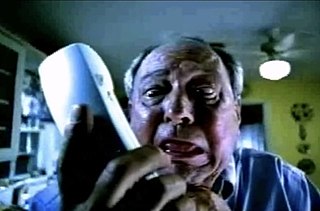
Meatballs was a political commercial aired during the 2000 United States presidential campaign in support of Reform Party candidate Pat Buchanan. The commercial, which was created by Houston-based agency Love Advertising, depicts a white man choking on a meatball while attempting to dial 9-1-1, but keeling over before the automated menu reaches the option for English. The ad highlighted Buchanan's support for making English the official language of the United States and his opposition to immigration policies of the time. Some analyses questioned the accuracy of the ad's claim that Buchanan's opponents were "writing off English for good".
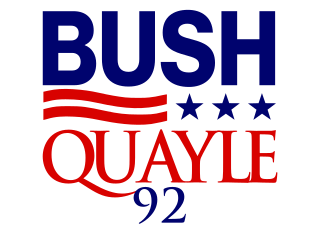
The 1992 presidential campaign of George H. W. Bush was an unsuccessful re-election campaign for 1992 United States presidential election by incumbent president George H. W. Bush, who had taken office on January 20, 1989. Bush and incumbent vice president Dan Quayle were defeated by Democratic presidential nominee Bill Clinton and vice presidential nominee Al Gore. Bush, a Republican president and former vice president under Ronald Reagan, launched his presidential bid on October 11, 1991, and secured nomination for his re-election on August 20, 1992. He was challenged in the Republican primaries by former White House Communications Director Pat Buchanan, who received less than one percent of the delegates in the Republican National Convention.

In 1996, Pat Buchanan, an American author and political commentator, sought the Republican Party (GOP) nomination for the 1996 United States presidential election. He lost the nomination to Bob Dole, who lost the general election.


















